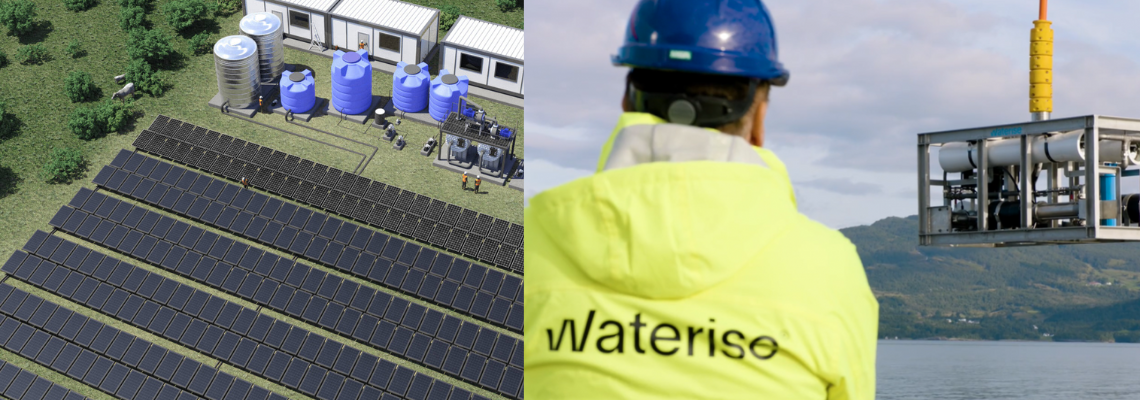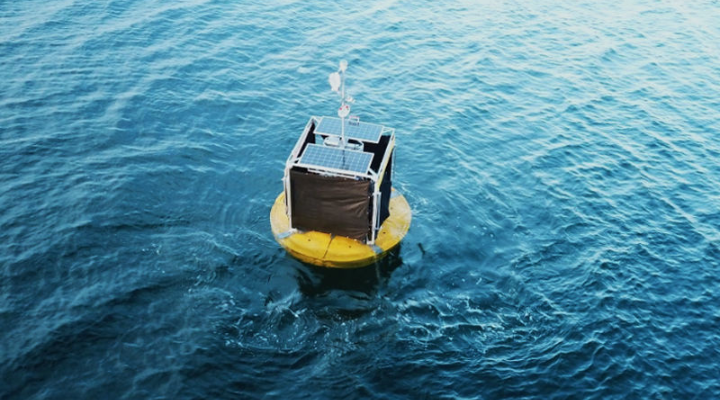
Desalination, or the process of turning saltwater into freshwater, is a promising solution for regions facing water scarcity. However, it is not without its challenges. Could decentralised, self-sufficient solutions be one answer?
The cost of desalination can be more significant than conventional water sources, making it unfeasible for many communities and countries. The process has also historically been more energy-intensive, requiring large amounts of electricity to push saltwater through filtration systems.
Despite these challenges, advances in technology and infrastructure have made desalination a viable option for some and continued innovation is vital for its long-term success.
In our latest TECH DIVE, we look at why there is a growing need for off-grid, self-sufficient desalination solutions. What flexibility can these solutions offer? And with a much smaller capacity, can these solutions scale up? And we look at some of the companies and start-ups paving the way.
Decentralised desalination is a process that involves placing desalination plants closer to the source of water, which is usually at the coast. Rather than having a centralised water supply system, decentralised desalination allows for smaller plants to be installed befitting the local community or business needs.
These plants treat the seawater, providing adequate water for consumption for the local population or a few businesses rather than the entire town/city. This design comes with numerous advantages, including reducing the cost of water production, reducing transportation costs, serving specific water needs such as in dry areas and some remote island communities and increasing access.
It is potentially a game-changer, particularly for the off-grid, self-sufficient areas that have no access to power grids and conventional water systems.
As the world's population and global warming continue to increase, the demand for freshwater has never been higher. Traditional means of obtaining freshwater, such as tapping into rivers and underground reserves, are increasingly becoming unsustainable.
Decentralised desalination is a solution that is more energy-efficient, easier to scale-up, and sustainable, making it a better solution to ensure water security in regions that are not well connected. Jamaica, for example, as part of its National Development Plan has set a goal of 100 per cent drinking water access for the country by 2030. The country has set its sights on a state desalination build out but a traditional large-scale plant that feeds into established storage facilities is not part of the plan. The country has started building small decentralised desalination plants in specific areas.
Alexei Levene, co-founder of decentralised desalination company Desolenator, told Aquatech Online: “Desalination is one of the fastest growing parts of the water industry. Traditionally, it's been all about big infrastructure and big power, with a philosophy that favors shipping it out, versus doing things on a local level. However, this has had several drawbacks. For example, in India, massive coal plants produce energy that is then shipped across the country, losing 50-70 per cent of it through transmission. Meanwhile, most people living in cities get their water through water trucks that burn fossil fuels, damaging the roads and the environment.
“In many parts of the world, distributed water systems make more sense, particularly for smaller communities that are off the beaten track. By creating your own water security, you also achieve energy security, since energy is needed for water. Moreover, with water and energy security, you can grow food and achieve food security. This is why desalination is growing rapidly and why it is a trend that looks set to continue.”
One significant advantage of decentralised desalination solutions is flexibility. These systems can be designed to fit different needs and be deployed in various locations. For example, in cities with poor water infrastructure, a decentralised desalination plant can help alleviate drinking water shortages.
Likewise, maritime communities limited to brackish water can quickly become water-sufficient with the help of decentralised desalination solutions. These systems can be designed in various sizes, from small-scale plants supporting communities to large-scale plants supporting the industrial sector.
Furthermore, decentralised design mitigates the water infrastructure's need, enabling smaller plants to be built to meet water requirements close to the population centre’s source. This design is rapidly replacing centralised designs in many regions and countries globally.
Here are some of the desalination solutions looking to improve how we access our water:

Waterise, a Norwegian start-up, has developed an innovative decentralised desalination method that operates 400m underwater on the seabed. The company claims that this approach can result in significant savings on energy and footprint.
Unlike traditional desalination plants situated near oceans, Waterise plans to take desalination to the bottom of the sea. By deploying containerised desalination systems underwater, the company leverages natural hydrostatic pre-membrane pressure.
In Norway, its pilot project in Boknafjorden has already demonstrated a 40 per cent reduction in energy usage, compared to conventional Reverse Osmosis technologies. Additionally, the company believes that its solution requires 80 per cent less land than land-based plants.
Privately owned by Norwegian shareholders, Waterise is moving forward on its first commercial installation in Saudi Arabia. The company is also engaged in discussions in other countries including Egypt, the Canary Islands and mainland Spain to roll out the technology.

Alexei Levene, Co-Founder of decentralised desalination product Desolenator, told Aquatech: “Desalination is one of the fastest growing parts of the water industry. Traditionally, it's been all about big infrastructure and big power, with a philosophy that favors shipping it out, versus doing things on a local level. However, this has had several drawbacks. For example, in India, massive coal plants produce energy that is then shipped across the country, losing 50-70 per cent of it through transmission. Meanwhile, most people living in cities get their water through water trucks that burn fossil fuels, damaging the roads and the environment.
“In many parts of the world, distributed water systems make more sense, particularly for smaller communities that are off the beaten track. By creating your own water security, you also achieve energy security, since energy is needed for water. Moreover, with water and energy security, you can grow food and achieve food security. This is why desalination is growing rapidly and why it is a trend that looks set to continue.”
Desolenator is a solar thermal decentralised desalination solution that works at scale harnessing the power of the sun to sustainably transform seawater into drinking water or ultrapure water.
Its patented technology harvests four times more energy from the sun than traditional PV panels using zero harmful chemicals, zero membranes, and zero energy intermittency.
Integrated with Zero Liquid Discharge, the circular technology enables the production of quality water and salt without producing any toxic brine, which has been coined a game-changing circular approach to desalination.
In 2022, Desolenator delivered its flagship plant for the Dubai Electricity and Water Authority (DEWA). Desolenator is currently scaling modular units each creating 40m3/hour at a levelised cost of water of less than 1 USD/1m3/day.
The company has also recently partnered with Silal, an Abu Dhabi food, agriculture, and technology company, to launch a pilot project using solar-powered desalination technology to produce fresh water for irrigation and provide a sustainable cooling option for greenhouses.
Alexei Levene adds: “While access to clean water is crucial, our world seems to overlook its value. Investment in sustainable hardware for water treatment is scarce, and we aren't progressing fast enough to make a significant change.
“Despite ongoing struggles, we've scored some major victories: last year, we completed a large-scale farm for the Dubai government to demonstrate our capabilities, and we have even more projects in the pipeline in Cambodia and Botswana.
“Unfortunately, progress is sluggish because of the lack of real support and corporate leadership. It's time for a shift in perspective, and the United Nations Convention on water served as a turning point. It's encouraging to see that people are understanding our reliance on water and pushing for change. We're getting more attention than ever, but we know there's still so much work to be done.”

Oneka Technologies has developed sustainable desalination units that convert seawater to fresh water using the renewable energy of ocean waves, making it a solution for large-scale water production. Its already-deployed system at the Algarrobo marina in Chile has expedited Oneka's mission to aid sustainable development goals while helping mining companies procure the vast amounts of water required for operations without compromising the country's natural freshwater resources.
Furthermore, Oneka has set up a demonstration site in Florida, where its first Iceberg unit is capable of producing up to 50 m3/day of freshwater daily. The location was strategically chosen to showcase the eco-consciousness of Oneka's solution to potential customers in the Caribbean and other regions.
Furthermore, Oneka has lined up a partnership with the City of Fort Bragg, California, and the Municipality of Barrington, Nova Scotia, to provide sustainable freshwater solutions to the communities.
Speaking to Aquatech Online, Oneka Technologies’ CEO and co-founder Dragan Tutic says: “There is a growing demand for desalination, but the process often relies on fossil fuels. To overcome this limitation, sustainable approaches are being developed. However, the water sector is conservative and skeptical towards untested technologies. To address this, companies are adapting their business models. One solution is to offer water as a service, thus shifting the financial and environmental risks to the providers.”
The company recently announced it is teaming up with AF Theriault, H2O Innovation, and the Town of Barrington, Nova Scotia for the Canada's Ocean Supercluster (OCC) project.
Tutic adds: “Regulations present another challenge for desalination projects. Nonetheless, the authorities are supportive of solutions that minimize environmental impacts. With no carbon emissions or land-use, safe intakes, and responsible brine disposal, new desalination approaches that emphasize these environmental benefits can streamline the regulation process.”